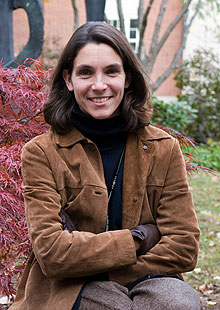  |
| HOME | THIS ISSUE | CALENDAR | GRANTS | BACK ISSUES | < BACK | NEXT > |
Humanitarianism program starting to take shape under new directorby Cindy Weiss - November 26, 2007 | ||||
| Alexis Dudden, director of the new Foundations of Humanitarianism program, faces the challenge of defining a concept that defies neat description. What is humanitarianism, and what is its scope? “It’s being responsible as a human member of society toward another human member of society,” Dudden says. “It involves the wider trajectories of Western Enlightenment and thought and 20th-century global thought.” Dudden, who this fall joined the College of Liberal Arts and Sciences as an associate professor of history, and Kerry Bystrom, associate director of the program and a new assistant professor of English, will gather and generate ideas and recruit other faculty around campus to focus on humanitarianism. Determining how to approach the subject may take months, however, because of its broad range. One certainty for Dudden is the relevance of her charge in a world facing so many humanitarian crises. The Foundations program will take up questions of how to respond to a humanitarian crisis, but it will also recognize the history behind the crisis, she says. The program will host outside speakers and conferences. Its first speaker, Christopher Gunness, spokesperson for the UN Relief Work Agency in Gaza and a former BBC reporter, will talk about “Chaos and Refugees” on Dec. 6 at 4 p.m. at the Jorgensen Center for the Performing Arts. His talk will precede the Jorgensen production of a play, Pentecost, directed by dramatic arts professor and department head Gary English, which explores similar themes. Foundations of Humanitarianism grew out of a successful 2005 Provost’s Grant Competition proposal by Richard Wilson, the Gladstein Distinguished Chair in Human Rights and director of the Human Rights Institute, and Richard Brown, Board of Trustees Distinguished Professor of History and director of the Humanities Institute, to provide a program for research and teaching that focused on the humanities-based origin of human rights work. It was designed to enrich and expand the undergraduate curriculum in human rights, diversity, and global studies; to increase scholarship by faculty; and to promote interdisciplinary connections among faculty from all humanities disciplines. Its first international conference, “Humanitarian Narratives of Inflicted Suffering,” was held here one year ago. The conference proceedings will soon be published by Cambridge University Press. “A number of universities now have human rights programs, but one of the measures that distinguishes the University of Connecticut’s from the others is the strength and depth of scholarship and teaching in the humanities,” says Wilson. Brown adds, “We want to emphasize the extent to which human rights is rooted in humanitarian ideology. That includes literature and the arts, areas that some human rights programs do not cover.”
Dudden said she wants Foundations of Humanitarianism to include a broad range of faculty. “Everyone is invited,” she says. Dudden left a post as associate professor at Connecticut College because she sees her new role as “a once-in-a-lifetime chance to try to define a bigger question.” Foundations in Humanitarianism will provide a means for faculty and graduate students “to engage in intellectual exchanges outside disciplines and programs and outside the responsibilities of teaching,” she says. That, in turn, will improve their teaching. The Foundation’s “center” is a table next to Dudden’s desk in the History Department at Wood Hall. “New cross-disciplinary programs always begin with a small table,” she jokes. Hers is laden with books that she is reading to prepare for her task. “Both Kerry and I are very interested in the question of how to take up humanitarianism,” she says. Dudden’s research interests are modern Japanese and Korean history. She has studied in both countries and is fluent in Japanese and knowledgeable in Korean. She earned her master’s and Ph.D. degrees from the University of Chicago and her bachelor’s degree from Columbia University. She is teaching Korean and Japanese history at UConn, with a focus on questions of human rights and whether they differ from humanitarianism. Dudden is about to publish a book, Troubled Apologies, on “the cultures of amnesia” in Japan and the U.S. since 1945 that have kept the U.S. from apologizing for bombing Nagasaki and Hiroshima and Japan from apologizing for its wartime actions on the ground in Asia. One of the objects in her new office is a toy Viewmaster slide viewer, sent to her by a former graduate student who had visited Los Alamos. Blazed across the souvenir viewer is its topic, “Atomic Tests in 3D.” It may provide a point of reference for a Foundations of Humanitarianism discussion. |
| ADVANCE HOME UCONN HOME |

